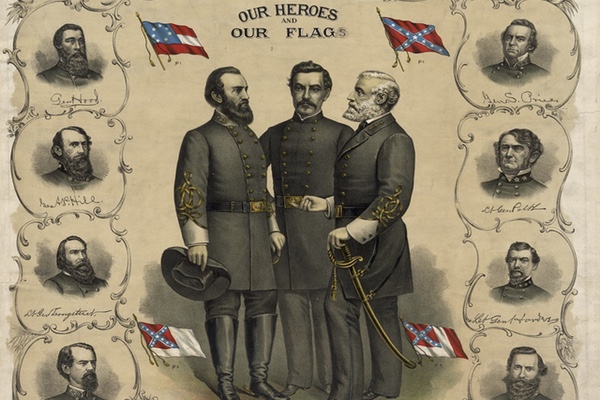How Does the Most Famous Border State Feel About the Confederate Flag?

1896 lithograph
A house divided reunited to remove the Confederate flag from the South Carolina capital on Friday. But this isn’t a North-South debate over free and enslaved peoples. It has deeper ideological and philosophical scars that have been irritated over the past few weeks. Perhaps no other state knows this division better than Kentucky.
Kentucky is one of the infamous border states during the Civil War; connected to three southern slave states and three northern free states with industrial and agricultural interests on all sides. Although only southwestern Kentucky most resembled the Deep South’s slave economy, many households across the state owned 2-3 slaves. Yet, much of Kentucky was rapidly distancing itself from this framework by embracing a rapidly changing economy that moved away from the exclusive production of tobacco and hemp to incorporate more grains, horses, and, of course, bourbon. Still, emancipation was anything but guaranteed.
Kentuckians were morally ambivalent about the issue of slavery. In 1861, Governor Beriah Magoffin warned Kentucky residents to remain neutral in order to prevent an immediate cross-border invasion from the North. The state was a buffer zone between the North and the South.
In today’s debate concerning the Confederate flag, neutrality is just as foggy in Kentucky as it was during the Civil War. Even Representative John Yarmouth’s congressional statement was as comprehensible as Magoffin’s stance. The flag is a relic of “hate and division,” Yarmouth proclaimed as he stood in opposition to an amendment that would allow the Confederate flag to be displayed at federally owned sites.
President Lincoln, too, tried to encourage Kentucky to remain as a buffer zone between the North and the South. Confederate sympathizers in Kentucky formed militias in opposition to their pro-Union counterparts as southern munitions travelled through the state to reach the Southern armies. Soon, Kentucky became a proponent of the Confederacy when its governor resigned to join former Vice President and Kentucky Democratic presidential candidate, John C. Breckinridge, in Bowling Green as the new shadow government brought Kentucky into the Confederacy.
Today, the state remains torn over the lasting significance of Confederate heritage. Many Kentuckians support the Confederate flag as a piece of heritage that preserves the memory of fallen Southern soldiers. Other Kentuckians are dismayed at the flag’s evolution and its adoption by white supremacists. “It was never intended for use by the KKK, by any motorcycle gang, any Nazi hate group or anything else,” one Kentuckian remarked.
A moderate Kentucky is once again striving to find a middle road between disparate philosophies. One resident, Richard Smith, defends his family lineage as a member of the Sons of Confederate Veterans. He fights for a freedom of speech that chooses not to glorify the racial degradation of the country. “I have never in my lifetime of attending,” reported Smith, “heard a racial word spoken, a racial comment made, a racial joke told, in a sons meeting.”
This is significant coming from a state that stubbornly sits in the aisle amidst national events. Although gay marriage is now the law of the land, public servants, like county court clerk Casey Davis, resist federal legislation by declining to issue marriage licenses. Kentucky Governor Steve Beshear warned Davis on Thursday she must immediately begin issuing marriage licenses to Kentucky citizens. She remains defiant and will likely spend time in jail as a result of her personal beliefs.
Kentucky “beliefs” continue to be the bulwark against progressivism. Despite being one of the most successful states to implement the Affordable Care Act, only 33% of its citizens hold a favorable view of the law. When pollsters supplanted the use of “Obamacare” with the name of the state’s exchange network, Kynect, most residents dropped such vitriolic responses. This might be due to political divides given the state only 30% approves of President Obama, even though the Democratic governor has an approval rating of 63%.
Maybe Kentuckians are simply a rational people who seek to avoid idealism. During the Civil War their economy depended little on the Deep South’s slave system even though Kentucky was the third largest slave-owning state behind Virginia and Georgia. Amidst the heightening Civil War, Kentucky voters elected pro-Unionist candidates to the state legislature. A few months later, the state officially joined the Confederacy under the approval of a majority of the state’s delegates.
In other words, Kentucky’s beliefs are often misaligned with its actions. Conservative residents defend marriage as the foundation of society even though some county clerks, opposed to gay marriage, are now issuing a blanket rejection of all marriage licenses. The state’s insurance exchange network is lauded so long as it isn’t called “Obamacare.” Confederate roots are denied though the flags are displayed at public venues.
Kentucky remains a house divided. The residents seemingly disagree with national progressivism while embracing liberal state initiatives when backed by their popular Democratic governor. For Kentuckians, the issue of the Confederate Flag, and even for the state’s role in the nation, represents something deeper than heritage. Neither is it an extension of resurgent states’ rights arguments. Personal freedoms are at stake. The idea that “my belief trumps yours” was the predominant view in antebellum Kentucky that resulted in its fickle stance during the Civil War. This view keeps Kentucky moderate despite polemics.
What is needed in the current Confederate debate isn’t a buffer state, but one that takes a strong stance as an unexpected leader of the Southern states. Kentucky should own its heritage: one that was strategic in the eventual Union victory, one as a national leader in healthcare policy, and one that can foremost abandon the racial stigma associated with the Confederate flag.